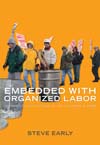trade unions
(For best results: allow video to load on `pause' before pressing play.)
Urgent appeal by the Korean Metal Workers Union and Korean Confederation of Trade Unions

Avril Boyne, more than eight months' pregnant, who has nine years' service at Thomas Cook, protesting at the closure of the travel agency and the redundancy package offered to staff at the Thomas Cook office, Grafton Street, Dublin. Thomas Cook is offering five weeks' pay for each year of service but workers are holding out for eight weeks. Photograph by Matt Kavanagh/Irish Times.
* * *
STOP PRESS: Thomas Cook sit-in raided by police, workers arrested!
Send protest/solidarity emails to wendy@thomascook.ie and fennj@tssa.org.uk
Public ownership of coal industry needed to move to 100% renewable energy and retain jobs

COSATU: Working-class internationalism in the era of deepening global economic crisis

Declaration of the Congress of South African Trade Unions International Solidarity Conference, Johannesburg, June 24-26, 2009.
COSATU -- Gathered at this historic International Solidarity Conference of COSATU are workers, activists and internationalists committed to a new and just world order, free from poverty, hunger and injustice. We have concluded two days of intensive engagements, critical reflections and dedicated work to assess and ascertain the revolutionary mood of workers and the poor masses of the world, the ebbs and flows of the global class struggle and the state of readiness by working-class forces and their organisations to wage a decisive battle for the new and just global economic system.
Iranian workers in action for democratic rights

Introduction by Robert Johnson and John Riddell
June 29, 2009 -- Socialist Voice -- The mass protests in Iran, sparked by charges of fraud in the June 12 presidential elections, express deeply felt demands for expanded democratic rights. The establishment press has been silent on the aspirations of rank-and-file protesters. Socialist Voice is therefore pleased to be able to publish several statements by components of Iran's vigorous trade union movement, which has been a major target of repression by Iran's security forces. We have provided the titles and some introductory comments.
Trade unions and New Zealand’s economic crisis

By Grant Brookes

[With the permission of Monthly Review Press, Links International Journal of Socialist Renewal is publishing an exclusive excerpt from Steve Early’s new book, Embedded With Organized Labor: Journalistic Reflections on the Class War at Home. Embedded With Organized Labor describes how trade union members in the United States have organised successfully, on the job and in the community, in the face of employer opposition now and in the past. Steve Early has produced a provocative series of essays -- an unusual exercise in “participatory labor journalism” useful to any reader concerned about social and economic justice. As workers struggle to survive and the labour movements try to revive during the current economic crisis, this book provides ideas and inspiration for trade union activists and friends of labour alike.
What’s wrong with a 30-hour work week?

By Don Fitz
May 30, 2009 -- With millions of jobs lost during the first part of 2009, who is calling for a shorter work week to spread the work around? Not the Republicans. Not even the Democrats. But why is there nary a peep from unions?
In the US, the vehicle industry sets the pace for organised labour. The only discussion at the top levels of the United Auto Workers Union (UAW) is how quickly the gains won during the last 50 years can be given back. Does the UAW have no memory of the 1930s and 1940s when a shorter work week was at centre of organising demands?
The gross domestic product is plummeting at the same time that jobs are disappearing. Why should there be any connection between the two? If society produces 10% less, why don’t we all just work 10% less? Didn’t things work like that for hundreds of thousands of years of human existence? When people figured out easier ways to get what they needed, they spent less time doing it.
United States: New prescription for a healthy union movement
Scenes from the NUHW founding convention.
By Carl Finamore
May 1, 2009 -- It’s not every day that a new national union is formed in the United States. But that’s exactly what happened on April 25 in San Francisco. If the National Union of Healthcare Workers (NUHW) turns out as planned, it’s a date for the history books.

By the Scottish Palestine Solidarity Campaign
April 22, 2009 -- The Scottish Trades Union Congress (STUC), representing every Scottish trade union, voted overwhelmingly to commit to boycott, divestment and sanctions against Israel. This is the third example of a national trade union federation [including Ireland and South Africa] committing to boycotts, divestment and sanctions and is a clear indication that, while Israel can kill Palestinians with impunity and Western support, it has lost the battle for world public opinion. It is now seen to be a state born out of ethnic cleansing and still expanding through the violent dispossession of the Palestinian people.

Demonstration in St-Denis, La Réunion, March 11.
By Richard Fidler
March 18, 2009 -- Life on the Left -- A 38-day general strike in the Caribbean colony of Martinique ended March 14 with the signing of a protocol between the government and the February 5 Collective, a coalition of trade unions and other social movements named after the day the strike began. The agreement grants the coalition’s key demands. About 20,000 people celebrated the historic victory in a march through the streets.
AFP reported that “the signing ceremony drew a crowd of thousands who gathered outside the island’s head administrative office. They repeatedly chanted a slogan ‘Matinik leve,’ or ‘Martinique stand up’ in the local Creole language.”
